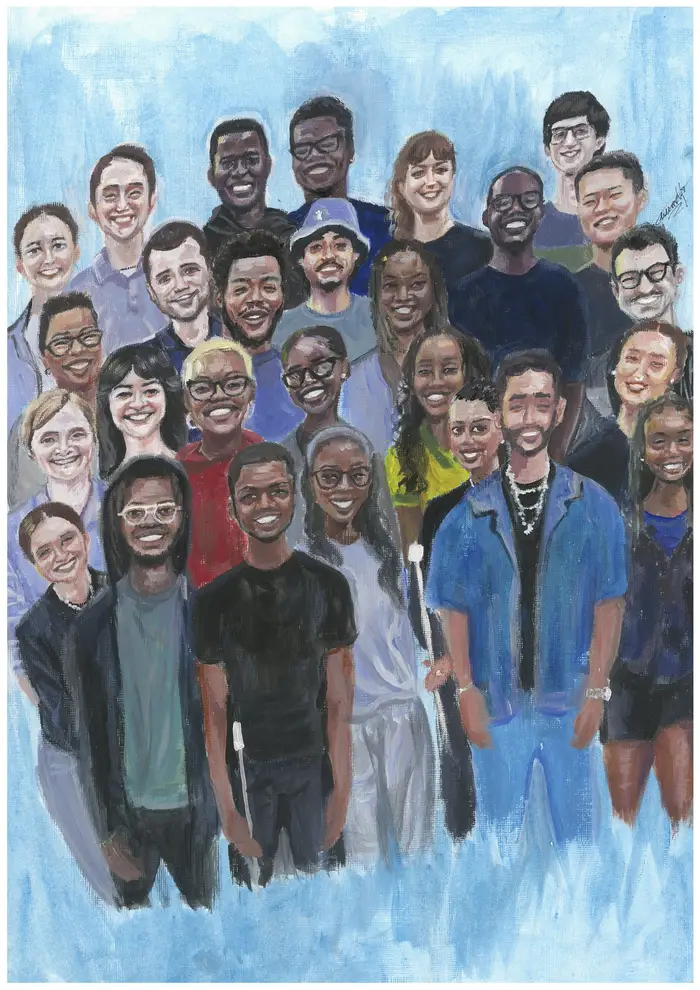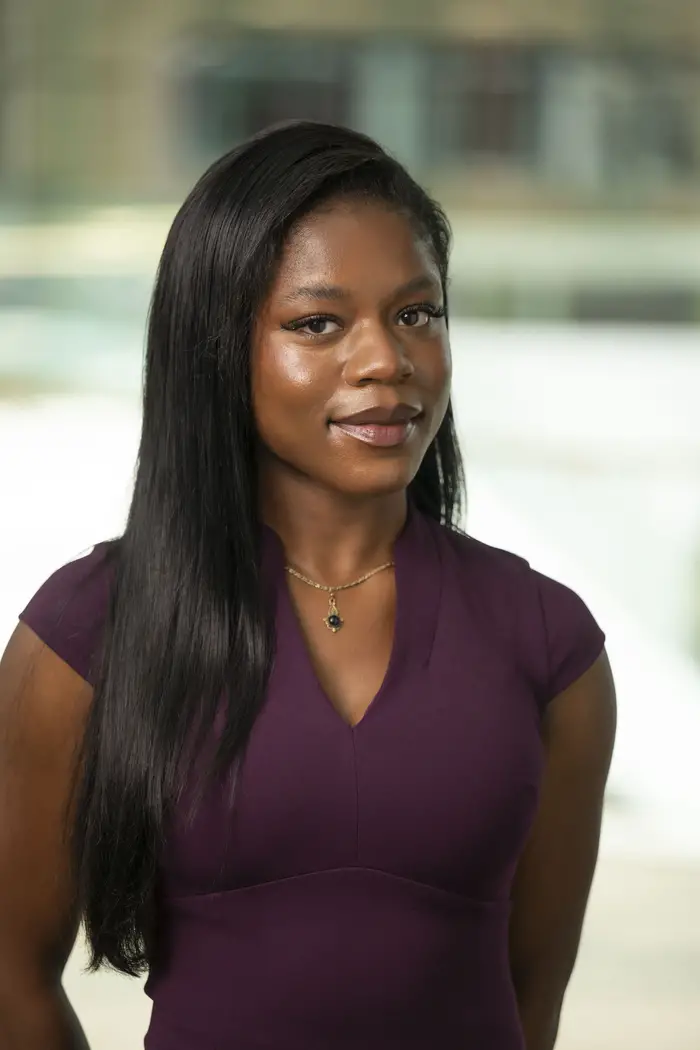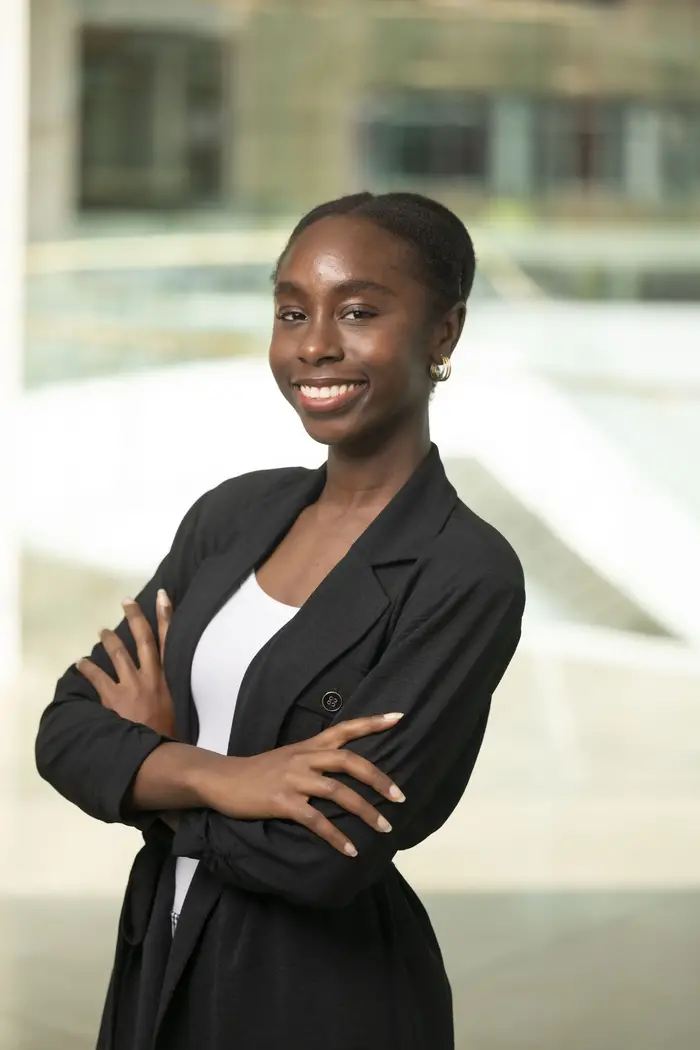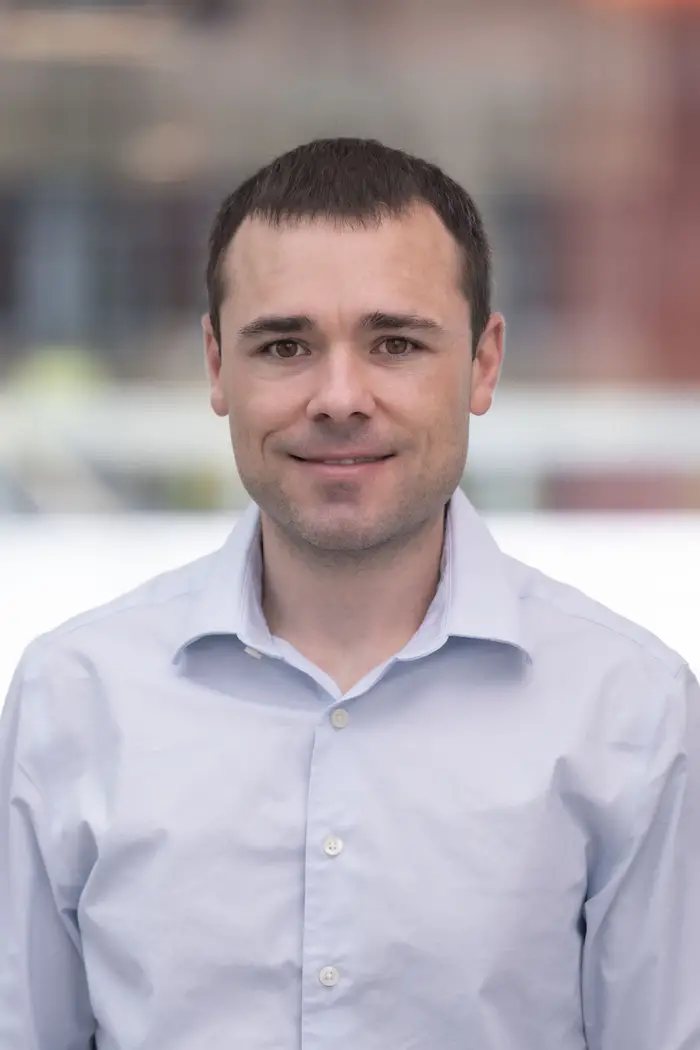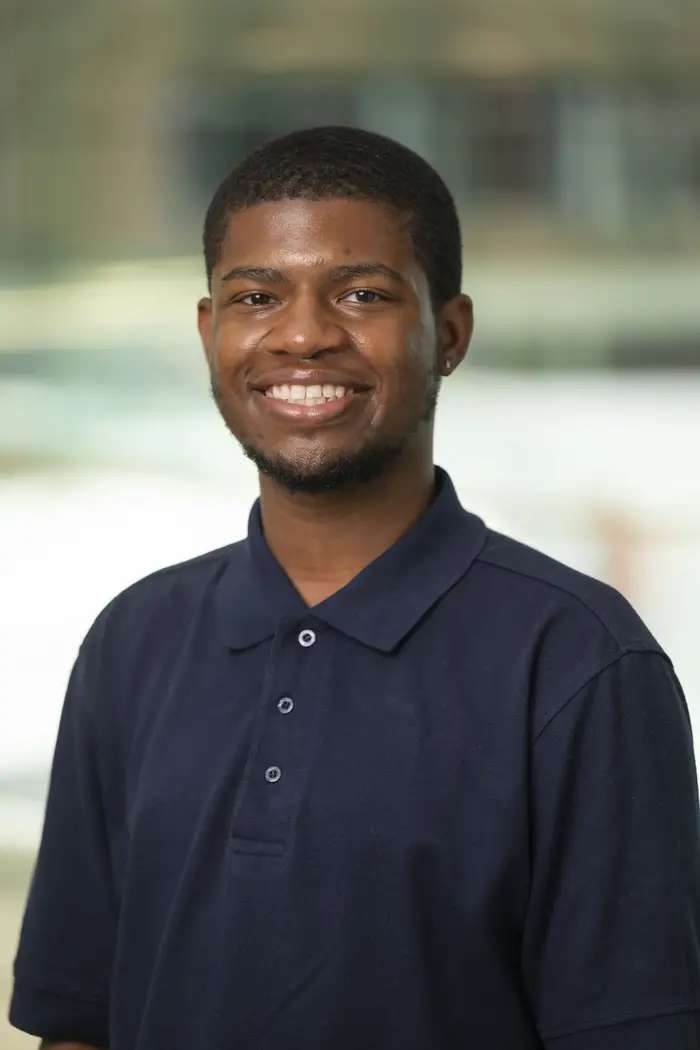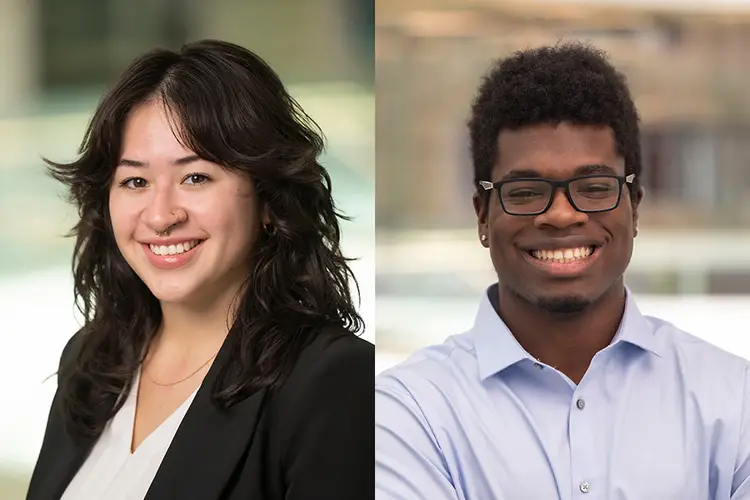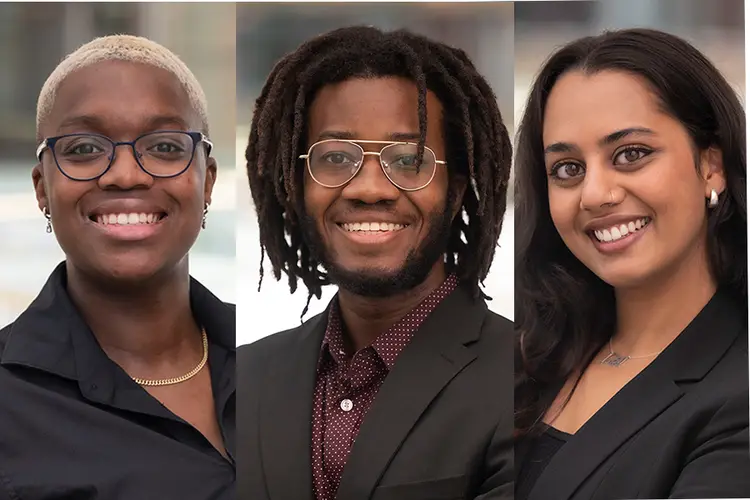Social Good Inspires Rales Fellows Studying Computer Science
Five graduate students chosen as part of the inaugural cohort of the Carnegie Mellon University Rales Fellows Program(opens in new window) are working in different aspects of computer science.
Each of them wants to learn more about the field not only to benefit their own careers, but also to share the knowledge of computer science with others and improve the world around them.
Even though they have taken different paths to reach their goals of advanced degrees at CMU, these Rales fellows are hoping their skills will one day impact others aiding in applications such as science research, educational tools, cybersecurity and privacy engineering.
Isabel Agadagba(opens in new window), Wendy Bickersteth(opens in new window), Erick Cohen(opens in new window), Nicholas Dunn(opens in new window) and Michael Sutton(opens in new window) are among a class of 22(opens in new window) pursuing graduate degrees at Carnegie Mellon through the Rales Fellows Program.
Launched in 2023(opens in new window), the program is dedicated to cultivating the next generation of science, technology, engineering and math (STEM) leaders while also increasing access to graduate-level education.
Isabel Agadagba wants to help digitally protect others
When she was growing up, Isabel Agadagba remembers her mom being a victim of a cyberattack. Agadagba grew up in Oklahoma and her parents are immigrants from Nigeria.
“I realized cybersecurity was something I wanted to explore in order to see how I can help people like my mom,” she said. “Though she was more susceptible to cybercrime, she couldn’t really protect herself as an immigrant.”
She earned bachelor’s degrees in computer science and film and TV from New York University last year, during which she researched supply chain security at the Depository Trust and Clearing Corporation (DTCC). The year-long initiative at DTCC exposed her to the complex and fascinating world of cybersecurity, guiding her choice to further her education in information technology and privacy engineering at CMU’s School of Computer Science(opens in new window).
“Here, you’re using your skills for the defense and the help of the user,” she said. “As users, being able to protect our data privacy — especially with AI growing exponentially — it's imperative now more than ever that people are able to protect themselves.”
She was inspired by CMU-Africa(opens in new window) and encouragement from Lorrie Cranor(opens in new window), director of the CyLab Security and Privacy Institute(opens in new window) and FORE Systems University Professor of Computer Science and of Engineering and Public Policy, to work on cryptocurrency research based at the Kigali, Rwanda, campus.
“While cryptocurrency and other digital currencies are incredible tools that can foster economic progression, it can also just as easily be weaponized to undermine progress, especially in developing countries,” Agadagba said.
Now that she’s studying at Carnegie Mellon, she said the amount of collaboration is much more than she’s used to, with group projects and research in each of her classes.
“That’s been a 180 from undergrad, just how much I have to communicate and work with people of different backgrounds and priorities and it can be a challenge,” Agadagba said. “It prepares you for the workforce, and how to use others' knowledge and insight to your benefit and ultimately for the success of the team.”
After finishing her degree, she plans to work as a privacy engineer or cybersecurity analyst, then eventually move to Nigeria to bring industry experience to her home.
“As much as it is technical, a lot of it revolves around industry standards and how policy and regulations affect how companies actually respond,” Agadagba said. “Hopefully I can leverage my expertise to develop solutions (or drive initiatives) from that dual perspective for my community.”
When she first joined the Rales Fellows program, she was nervous about not finding a like-minded and diverse community to rely on as she did in New York City, but the Rales summer academy and weekend retreat at Seven Springs really boosted her spirits.
“I remember, after that weekend, calling my friends and sister to let them know I found my people here in Pittsburgh,” she said, adding that she felt very welcome by everyone involved in the program.
Wendy Bickersteth wants to educate through societal computing
As an undergraduate at the University of Maryland Baltimore County, Wendy Bickersteth realized that the best way she learned was by explaining concepts to others, working as a tutor with students, then as a mentor for other tutors.
Combining that fondness for teaching with technology, she decided to pursue her Ph.D. in Societal Computing in the School of Computer Science(opens in new window) at Carnegie Mellon.
“The tech industry is a place where so many things happen, so I would like to be a part of making sure innovations in technology are still considering the human aspect of it,” she said.
Once she knew she was interested in Societal Computing, Bickersteth also reached out to Cranor, who suggested she apply to the Rales Fellows program.
“It’s been like a bunch of domino pieces since then,” Bickersteth said.
She earned her bachelor’s degree in Information Systems, and worked on a project to understand people’s mental models of privacy and security in the technology they use.
“It’s maybe unsurprising, but a lot of people tend to not really know what’s going on, they just have a product and know how to use the parts they care about, then that’s where it stops most of the time,” she said.
Now, at CMU, she’s working on a project about generative AI risks and failure modes — the factors that contribute to those risks — then created a taxonomy for them both. In another, she’s helping analyze the design of and information on Apple’s privacy labels.
Once she earns her Ph.D., Bickersteth plans to work in the industry, but revisit her love for teaching later in her career.
After participating as a Center for Women in Technology Scholar at UMBC, she said she appreciated how the Rales Fellows program has fostered not only professional connections but also a sense of community among the fellows.
“We’re all genuinely friends and it’s been very beneficial,” she said.
Someday she also hopes to incorporate her interest in art into her work. In the meantime, a painting by Bickersteth of the cohort of fellows together with staffers, inspired by a photo taken during the group’s orientation, hangs in the Rales Fellows lounge in the WQED building.
“I made the painting in August when I had COVID,” she said, jokingly adding, “let’s just say I should never paint 27 people again.”
Erick Cohen aspires to make others’ lives easier through coding
During a statistics class as an undergraduate, Cohen saw the power of computer science firsthand when a professor at George Washington University took more than an entire class session to work out a linear regression by hand.
“I still vividly remember him going, ‘Nowadays, people just do this with computer programs,’ and with like three lines of code, what took us over an hour to do, he did in three seconds,” Cohen said. “And in that moment I realized, ‘this is what I really like, this is what I need to do.’”
At the time, he was too far along to change his major from economics and international affairs to computer science, but took as many programming classes as he could, then landed internships and jobs centered around data analytics.
But Cohen felt like something was missing and wanted to solidify his experience to work toward an advanced degree, so he is now pursuing a Master of Science in Data Analytics for Science(opens in new window) through the Mellon College of Science(opens in new window).
“I had some experience working in scientific research, I thought this could be a really good STEM pivot for me and round out my knowledge,” he said.
After his father died unexpectedly in 2023, Cohen said the Rales Fellows program made pursuing a degree possible.
“With the financial assistance, I’m able to make sure my mom is taken care of, and I’m able to be a student and only focus on being a student,” Cohen said. “This is the first time I can just put my head down and be a student, there’s nothing holding me back. That’s incredible.”
Born in Buenos Aires, Argentina, and raised in Miami, Florida, Cohen earned his bachelor’s degree then worked at an insurance brokerage.
“I really harped on them: ‘There's so much we could do with data and automation,’” he said, eventually taking another role with the U.S. Science and Technology Policy Institute, assisting researchers with data-related tasks.
“That was such a rewarding experience, I learned so much from that job,” he said. “I got the confidence in my skills and saw this path that I loved going down.”
Then, he took on a role at Deloitte, working on projects for Meta.
“If you had asked me if I would ever contribute code to Facebook, I would have said, ‘you’re crazy,’ ” he said. “When someone gives you an opportunity like that, it’s pretty cool.”
The efficiency gained from coding appeals to Cohen, who said he’s written simple programs for his partner when she’s complained about repetitive tasks.
“Things like that really drive me to do this,” he said. “When software can make someone’s life better, that’s what it’s all about.”
In a rapidly changing field, Cohen said regardless of the field or focus, he wants to make sure the path he follows with his degree includes coding software.
“I know that I'll always love coding,” he said. “I want to have a role where I can have my hands on the keyboard.”
Cohen appreciates that through research at the Mellon College of Science applied in the biological and life sciences, that code can turn into drug discovery and better outcomes for health care patients.
“Everybody wants to do the cutting-edge sexy stuff, like machine learning, but what I’ve found is that it's important to focus on the basics,” he said. “You can't use large language models if you don't have a database or if you don't know how to load the data. A lot of people just want to jump ahead to what's on the cutting edge without having that foundation. Foundation is key.”
Thankful for the Rales Fellows program, Cohen said he is also appreciative of the way the cohort of students from different personal and academic backgrounds have bonded, and the way the program’s team helps them all feel supported.
“I've only gotten to where I have because other people gave me a chance and believed in me,” Cohen said. “I feel that from the Rales team as well, if they're willing to give me a chance that's a big driver to do the best that I can.”
Nicholas Dunn wants to stay open-minded to future opportunities
While earning his bachelor’s degrees in mathematics and computer science from Columbus State University, Dunn interned with the Robotics Institute(opens in new window) at Carnegie Mellon.
“That really connected me to CMU and I really liked the community and established connections while I was there,” he said, including with Rachel Burcin(opens in new window), global programs manager and co-director of the Robotics Institute Summer Scholars(opens in new window) program.
Originally from Smiths Station, Alabama, Dunn relocated to Pittsburgh to earn a master’s degree in computer science(opens in new window) with his two children, who are 6 years old and 7 years old, and his wife, who Dunn said has always been very supportive of his academic career. They all enjoyed a “mini-vacation” together in the city before he started his program in the fall.
“We went to the zoo and the museums together, it was all very nice,” Dunn said.
So far, Dunn said he’s enjoyed his classes in machine learning and computer systems, while spending time in the Gates-Hillman Complex, especially when working on assignments.
“I really like the facilities at Carnegie Mellon,” he said. “They provide a lot of space for students to work and study, and that’s very nice since I have a long commute.”
Working toward a master’s degree in computer science, Dunn said he plans to work in industry after graduating. He has also enjoyed working with his adviser, Dave Eckhardt(opens in new window), teaching professor in the School of Computer Science.
“I don't want to limit my opportunities, so I want to stay pretty open now and when I'm searching for jobs,” he said.
Michael Sutton plans to develop accessible educational tools
While studying computer science at the Massachusetts Institute of Technology, Michael Sutton developed a love for teaching.
He served as a lecturer assistant, an English tutor for non-native speakers and a STEM tutor for elementary and middle school students.
Chosen for a 2023 Fulbright fellowship(opens in new window), Sutton spent a year teaching English in Taiwan, but wasn’t sure how that would translate to the next step in his career.
“I really found joy from that, but my major was computer science, so what did that mean?” said Sutton, now studying in the Master of Educational Technology and Applied Learning Sciences(opens in new window) program, drawn to it because of its interdisciplinary nature.
“Since the program is situated in the School of Computer Science rather than, say, a school of education, you get a different perspective on educational technology more grounded in evidence-based practices,” he said.
Now, Sutton is examining analytics to better understand various metrics of student engagement, including their participation rate and performance over time, taking into account how their experiences and backgrounds influence how they interact with course content.
“I’m learning a lot about how we can use the data to make education better for everyone and how we can make sure we are offering proper support and guidance for students who might need more to make sure everyone can get to the same playing field,” he said. “I used to be afraid of big data, but now I’m getting more prepared to look at different AI and machine learning models.”
Exploring interdisciplinary courses at Carnegie Mellon, Sutton was also recently accepted into the Engineering and Public Policy master’s program(opens in new window) to further “bridge the technical and policy aspects of education in order to address systemic challenges,” he said.
After finishing his degree, Sutton hopes to work designing educational tools that address those needs different types of learners have. He also hopes to better understand and take into consideration policies that might constrain those solutions as well as students’ access.
“It’s important that students know how to use technology that is being developed, and that it is accessible, so it can be utilized to make their education go further,” he said.
Echoing other fellows, Sutton called the Rales program “magical” because of the way it has brought the students together.
“Everyone gets along and it’s very cohesive within the cohort,” he said. “The Rales staff did an amazing job of choosing people who fit into this community, are there for each other and support each other.”
